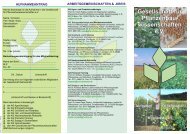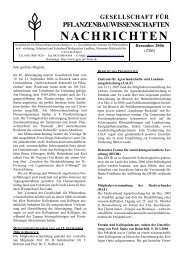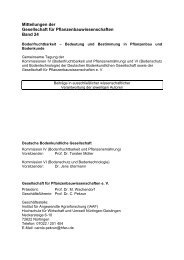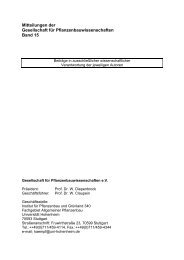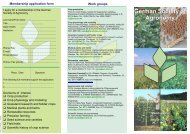- Seite 1 und 2:
Mitteilungen der Gesellschaft für
- Seite 3 und 4:
Wir danken für die finanzielle Unt
- Seite 5 und 6:
II Wagner B., B. Pfützner, H. Ihli
- Seite 7 und 8:
IV Sommer H., G. Leithold: Vergleic
- Seite 9 und 10:
VI Manderscheid, R., M. Erbs, H.-J.
- Seite 11 und 12:
VIII Gauder M., K. Butterbach-Bahl,
- Seite 13 und 14:
X of zeolite, agrisorb and lignite
- Seite 15:
XII Loel J., C. Hoffmann: Winterrü
- Seite 19 und 20:
2 leistungsfähiger Nitrifikations-
- Seite 21 und 22:
4 Ackerkulturen wie Weizen und Mais
- Seite 23 und 24:
6 ermöglicht eine rationalere Gest
- Seite 25 und 26:
8 Überschuss auf den landwirtschaf
- Seite 27 und 28:
10 erforderliche Energiebedarf übe
- Seite 29 und 30:
12 auch komplexer Bewertungen, die
- Seite 31 und 32:
14 dine höher als der der Glutenin
- Seite 33 und 34:
16 nachweisen. In Nährlösungsvers
- Seite 35 und 36:
18 Zörb, C., Steinfurth, D., Selin
- Seite 37 und 38:
20 Die Stickstoffnutzungseffizienz
- Seite 39 und 40:
22 höheren Skalenebenen zu einer Z
- Seite 41 und 42:
Mitt. Ges. Pflanzenbauwiss. 23: 24-
- Seite 43 und 44:
Mitt. Ges. Pflanzenbauwiss. 23: 26
- Seite 45 und 46:
28 Ergebnisse und Diskussion In den
- Seite 47 und 48:
30 Ertragsstrukturanalyse ergab kei
- Seite 49 und 50:
32 Ergebnisse Vier Wochen nach der
- Seite 51 und 52:
34 Neutralität dieses Düngers inn
- Seite 53 und 54:
36 als die Mais-Weizen-Welsches Wei
- Seite 55 und 56:
Tab. 1: Nitrat-N-Auswaschung, N-Ent
- Seite 57 und 58:
40 Tab. 1: Kornerträge und Stickst
- Seite 59 und 60:
42 Ammoniak und Lachgas entweichen
- Seite 61 und 62:
44 Results and Discussion In the fi
- Seite 63 und 64:
46 Zur Simulation der 3D-Grundwasse
- Seite 65 und 66:
Tab. 1: Inhaltsstoffgehalte in Abh
- Seite 67 und 68:
50 rüben war aufgrund des geringer
- Seite 69 und 70:
52 Die ertragsbetonte Sorte Klarina
- Seite 71 und 72:
54 Nach dem Einsatz der organischen
- Seite 73 und 74:
56 kann für die Selektion und Züc
- Seite 75 und 76:
58 TKM- und HLG-Werte) verbesserte.
- Seite 77 und 78:
60 Tab. 1: 15 N-Anreicherungsgrad v
- Seite 79 und 80:
62 In contrast to leaf measurements
- Seite 81 und 82:
64 früherer Termine bis zum für D
- Seite 83 und 84:
66 Die Untersuchungen wurden mit ve
- Seite 85 und 86:
68 Product analysis with 15% false
- Seite 87 und 88:
70 mineralisch gedüngten Varianten
- Seite 89 und 90:
72 Bodenbearbeitungen, was auf die
- Seite 91 und 92:
74 regulierung. Die symbiotische N2
- Seite 93 und 94:
Lufttemperatur [°C] Kh [cm h -1 ]
- Seite 95 und 96:
78 Ertragsbildung der Erbse konnte
- Seite 97 und 98:
80 örtlich ausgebrachten Düngemen
- Seite 99 und 100:
82 (2. Schnitt: p
- Seite 101 und 102:
84 und korrosionsrelevanten Element
- Seite 103 und 104:
86 Niveau. Mit Ausnahme des IFBB-Br
- Seite 105 und 106:
88 beziehungen multi-variat statist
- Seite 107 und 108:
90 20 Messpositionen mit je vier Wi
- Seite 109 und 110:
92 überwogen Sortenunterschiede di
- Seite 111 und 112:
94 A. Die Maissorte Deco erreichte
- Seite 113 und 114:
96 unterschiedlichen Düngungsstufe
- Seite 115 und 116:
98 ~ 3 cm die höchsten Überlebens
- Seite 117 und 118:
100 signifikante Unterschiede. Die
- Seite 119 und 120:
102 berücksichtigten, wiesen keine
- Seite 121 und 122:
104 Bodentiefe und Biomasseprodukti
- Seite 123 und 124:
Mitt. Ges. Pflanzenbauwiss. 23: 106
- Seite 125 und 126:
Mitt. Ges. Pflanzenbauwiss. 23: 108
- Seite 127 und 128:
Mitt. Ges. Pflanzenbauwiss. 23: 110
- Seite 129 und 130:
Mitt. Ges. Pflanzenbauwiss. 23: 112
- Seite 131 und 132:
Mitt. Ges. Pflanzenbauwiss. 23: 114
- Seite 133 und 134:
Mitt. Ges. Pflanzenbauwiss. 23: 116
- Seite 135 und 136:
Mitt. Ges. Pflanzenbauwiss. 23: 118
- Seite 137 und 138:
Mitt. Ges. Pflanzenbauwiss. 23: 120
- Seite 139 und 140:
Mitt. Ges. Pflanzenbauwiss. 23: 122
- Seite 141 und 142:
Mitt. Ges. Pflanzenbauwiss. 23: 124
- Seite 143 und 144:
Mitt. Ges. Pflanzenbauwiss. 23: 126
- Seite 145 und 146:
128 1. Teil: “Extension and evalu
- Seite 147 und 148:
Mitt. Ges. Pflanzenbauwiss. 23: 130
- Seite 149 und 150:
132 Der Fruchtfolgeversuch (V2) erg
- Seite 151 und 152:
Mitt. Ges. Pflanzenbauwiss. 23: 134
- Seite 153 und 154:
136 Fig. 1: Simulated (lines) and o
- Seite 155 und 156:
Mitt. Ges. Pflanzenbauwiss. 23: 138
- Seite 157 und 158:
140 niedriger war als in MA oder RE
- Seite 159 und 160:
Mitt. Ges. Pflanzenbauwiss. 23: 142
- Seite 161 und 162:
Mitt. Ges. Pflanzenbauwiss. 23: 144
- Seite 163 und 164: Mitt. Ges. Pflanzenbauwiss. 23: 146
- Seite 165 und 166: Mitt. Ges. Pflanzenbauwiss. 23: 148
- Seite 167 und 168: Mitt. Ges. Pflanzenbauwiss. 23: 150
- Seite 169 und 170: Mitt. Ges. Pflanzenbauwiss. 23: 152
- Seite 171 und 172: Mitt. Ges. Pflanzenbauwiss. 23: 154
- Seite 173 und 174: Mitt. Ges. Pflanzenbauwiss. 23: 156
- Seite 175 und 176: Mitt. Ges. Pflanzenbauwiss. 23: 158
- Seite 177 und 178: Mitt. Ges. Pflanzenbauwiss. 23: 160
- Seite 179 und 180: Mitt. Ges. Pflanzenbauwiss. 23: 162
- Seite 181 und 182: 164 Herbizide erreichten an diesem
- Seite 183 und 184: Mitt. Ges. Pflanzenbauwiss. 23: 166
- Seite 185 und 186: Mitt. Ges. Pflanzenbauwiss. 23: 168
- Seite 187 und 188: Mitt. Ges. Pflanzenbauwiss. 23: 170
- Seite 189 und 190: Mitt. Ges. Pflanzenbauwiss. 23: 172
- Seite 191 und 192: Mitt. Ges. Pflanzenbauwiss. 23: 174
- Seite 193 und 194: Mitt. Ges. Pflanzenbauwiss. 23: 176
- Seite 195 und 196: Mitt. Ges. Pflanzenbauwiss. 23: 178
- Seite 197 und 198: Mitt. Ges. Pflanzenbauwiss. 23: 180
- Seite 199 und 200: Mitt. Ges. Pflanzenbauwiss. 23: 182
- Seite 201 und 202: Mitt. Ges. Pflanzenbauwiss. 23: 184
- Seite 203 und 204: Mitt. Ges. Pflanzenbauwiss. 23: 186
- Seite 205 und 206: Mitt. Ges. Pflanzenbauwiss. 23: 188
- Seite 207 und 208: Mitt. Ges. Pflanzenbauwiss. 23: 190
- Seite 209 und 210: Mitt. Ges. Pflanzenbauwiss. 23: 192
- Seite 211 und 212: Mitt. Ges. Pflanzenbauwiss. 23: 194
- Seite 213: Mitt. Ges. Pflanzenbauwiss. 23: 196
- Seite 217 und 218: 200 Humusreproduktion. In der reine
- Seite 219 und 220: N-Düngung (kg ha -1 ) Mitt. Ges. P
- Seite 221 und 222: Mitt. Ges. Pflanzenbauwiss. 23: 204
- Seite 223 und 224: P 2 O 5 K 2 O CaO Pflanzenschutz N
- Seite 225 und 226: Mitt. Ges. Pflanzenbauwiss. 23: 208
- Seite 227 und 228: Mitt. Ges. Pflanzenbauwiss. 23: 210
- Seite 229 und 230: Mitt. Ges. Pflanzenbauwiss. 23: 212
- Seite 231 und 232: Mitt. Ges. Pflanzenbauwiss. 23: 214
- Seite 233 und 234: Mitt. Ges. Pflanzenbauwiss. 23: 216
- Seite 235 und 236: Mitt. Ges. Pflanzenbauwiss. 23: 218
- Seite 237 und 238: Mitt. Ges. Pflanzenbauwiss. 23: 220
- Seite 239 und 240: Mitt. Ges. Pflanzenbauwiss. 23: 222
- Seite 241 und 242: Mitt. Ges. Pflanzenbauwiss. 23: 224
- Seite 243 und 244: Mitt. Ges. Pflanzenbauwiss. 23: 226
- Seite 245 und 246: Mitt. Ges. Pflanzenbauwiss. 23: 228
- Seite 247 und 248: Mitt. Ges. Pflanzenbauwiss. 23: 230
- Seite 249 und 250: Mitt. Ges. Pflanzenbauwiss. 23: 232
- Seite 251 und 252: Mitt. Ges. Pflanzenbauwiss. 23: 234
- Seite 253 und 254: Mitt. Ges. Pflanzenbauwiss. 23: 236
- Seite 255 und 256: Mitt. Ges. Pflanzenbauwiss. 23: 238
- Seite 257 und 258: Mitt. Ges. Pflanzenbauwiss. 23: 240
- Seite 259 und 260: Mitt. Ges. Pflanzenbauwiss. 23: 242
- Seite 261 und 262: Mitt. Ges. Pflanzenbauwiss. 23: 244
- Seite 263 und 264: Mitt. Ges. Pflanzenbauwiss. 23: 246
- Seite 265 und 266:
Mitt. Ges. Pflanzenbauwiss. 23: 248
- Seite 267 und 268:
Mitt. Ges. Pflanzenbauwiss. 23: 250
- Seite 269 und 270:
Mitt. Ges. Pflanzenbauwiss. 23: 252
- Seite 271 und 272:
Mitt. Ges. Pflanzenbauwiss. 23: 254
- Seite 273 und 274:
Mitt. Ges. Pflanzenbauwiss. 23: 256
- Seite 275 und 276:
Mitt. Ges. Pflanzenbauwiss. 23: 258
- Seite 277 und 278:
Mitt. Ges. Pflanzenbauwiss. 23: 260
- Seite 279 und 280:
262 Metalaxyl- M (no. 2) induced hi
- Seite 281 und 282:
264 Tab. 1: Oberirdische Biomasse,
- Seite 283 und 284:
266 gungsvariante eine Zunahme beob
- Seite 285 und 286:
Mitt. Ges. Pflanzenbauwiss. 23: 268
- Seite 287 und 288:
Mitt. Ges. Pflanzenbauwiss. 23: 270
- Seite 289 und 290:
Mitt. Ges. Pflanzenbauwiss. 23: 272
- Seite 291 und 292:
Mitt. Ges. Pflanzenbauwiss. 23: 274
- Seite 293 und 294:
Mitt. Ges. Pflanzenbauwiss. 23: 276
- Seite 295 und 296:
Mitt. Ges. Pflanzenbauwiss. 23: 278
- Seite 297 und 298:
Mitt. Ges. Pflanzenbauwiss. 23: 280
- Seite 299 und 300:
Mitt. Ges. Pflanzenbauwiss. 23: 282
- Seite 302 und 303:
Autorenverzeichnis Angulo C. ......
- Seite 304 und 305:
Kuhn K. ...........................
- Seite 306:
Weiß K. ..........................



